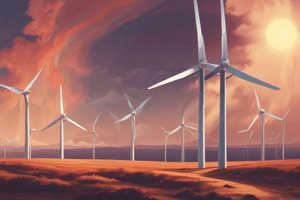Podcast
Questions and Answers
Which type of thermal power plant is a more efficient version of the steam plant, utilizing two separate heat recovery steam generators and turbines?
Which type of thermal power plant is a more efficient version of the steam plant, utilizing two separate heat recovery steam generators and turbines?
- Hydroelectric
- Wind
- Steam
- Combined Cycle (correct)
Which source of electric power generation has historically been the primary source and provides a reliable and abundant supply of energy?
Which source of electric power generation has historically been the primary source and provides a reliable and abundant supply of energy?
- Geothermal energy
- Hydropower (correct)
- Wind energy
- Solar energy
In which type of geothermal power plant does hot water from deep underground heat a secondary fluid with a lower boiling point to drive turbine generators?
In which type of geothermal power plant does hot water from deep underground heat a secondary fluid with a lower boiling point to drive turbine generators?
- Photovoltaic
- Binary Cycle (correct)
- Concentrating Solar Power
- Flash Steam
What technology converts the kinetic energy of wind into electricity, making it an important source of renewable energy?
What technology converts the kinetic energy of wind into electricity, making it an important source of renewable energy?
What is the primary function of large-scale dams in the context of hydroelectric power plants?
What is the primary function of large-scale dams in the context of hydroelectric power plants?
Which renewable energy source is characterized by the process of converting sunlight directly into electricity using solar panels?
Which renewable energy source is characterized by the process of converting sunlight directly into electricity using solar panels?
Which renewable energy source has seen rapid growth with increasing efficiency and decreasing costs due to harnessing the sun's energy?
Which renewable energy source has seen rapid growth with increasing efficiency and decreasing costs due to harnessing the sun's energy?
How do pumped storage hydroelectric power plants operate in terms of water usage during periods of electricity demand?
How do pumped storage hydroelectric power plants operate in terms of water usage during periods of electricity demand?
What significant feature makes fossil fuels like coal, oil, and natural gas historically important sources for electricity generation?
What significant feature makes fossil fuels like coal, oil, and natural gas historically important sources for electricity generation?
In areas with volcanic activity or hot springs, which renewable source of energy from the Earth's crust has emerged as an important source of electricity?
In areas with volcanic activity or hot springs, which renewable source of energy from the Earth's crust has emerged as an important source of electricity?
Flashcards are hidden until you start studying
Study Notes
Electric Power: Understanding Generation
Electric power is a fundamental feature of modern life, enabling light, heat, and countless other comforts and conveniences. Understanding how electric power is generated forms the foundation of this discussion. Let's delve into the various sources and methods of generating electricity.
Sources of Electric Power Generation
-
Fossil Fuels: Coal, oil, and natural gas have historically been the primary sources of electricity generation. They provide a reliable and abundant supply of energy.
-
Renewable Energy: a. Solar: Harnessing the sun's energy through photovoltaic (PV) panels has seen rapid growth in recent years, with increasing efficiency and decreasing costs. b. Wind: Wind turbines convert the kinetic energy of wind into electricity. They are an important source of renewable energy, particularly in areas with consistent wind patterns. c. Hydropower: Harnessing the kinetic energy of moving water in rivers and streams has been a primary source of electricity for over a century. Large-scale hydroelectric dams, such as the Three Gorges Dam in China, provide a significant portion of the world's electricity. d. Geothermal: Harnessing the heat energy from the Earth's crust has emerged as an important renewable source of electricity, particularly in areas with volcanic activity or hot springs. e. Biomass: Burning organic matter to produce electricity has been in use for centuries, and modern biomass power plants are more efficient and environmentally friendly than their historical counterparts.
Basic Principles and Technologies of Electric Power Generation
-
Thermal Power Plants: a. Steam: The most common type of thermal power plant, it heats water to create steam, which drives turbine generators. Coal, oil, and natural gas are often used as fuel sources. b. Combined Cycle: A more efficient version of the steam plant, it uses two separate heat recovery steam generators and turbines, resulting in higher efficiency and lower emissions.
-
Hydroelectric Power Plants: a. Conventional: Large-scale dams harness the kinetic energy of flowing water to rotate turbine generators. b. Pumped Storage: A form of hydroelectric power that operates in a cycle, pumping water uphill during periods of low electricity demand and releasing it to generate electricity during periods of high demand.
-
Wind Power Plants: a. Onshore: Wind turbines installed on land. b. Offshore: Floating wind turbines located in the ocean.
-
Solar Power Plants: a. Photovoltaic: Solar panels convert sunlight directly into electricity. b. Concentrating Solar Power: Large mirrors concentrate sunlight onto heat-absorbing structures, creating steam that drives turbine generators.
-
Geothermal Power Plants: a. Flash Steam: Hot water from deep underground is flashed into steam, which drives turbine generators. b. Binary Cycle: Hot water from deep underground heats a secondary fluid with a lower boiling point, which is then vaporized to drive turbine generators.
Challenges and Advances in Electric Power Generation
-
Climate Change: Greenhouse gas emissions from electric power generation contribute to global warming. Renewable energy sources are becoming increasingly important, as they produce little to no greenhouse gas emissions.
-
Energy Storage: Energy storage is an essential component of modern electric grids, allowing for the integration of renewable energy sources and ensuring a reliable supply of electricity.
-
Smart Grid: The development of smart grid technologies will facilitate the integration of renewable energy sources, increase grid efficiency, and enhance power reliability.
-
Public Policy: Changes in public policy, such as renewable energy targets, carbon pricing, and subsidies, can significantly impact electric power generation and energy markets.
Understanding the sources and technologies of electric power generation is essential for anyone interested in the energy sector and the future of our planet. With the growth of renewable energy sources, electric power generation is poised for significant change as we strive to balance the need for reliable energy with the imperative to protect our environment.
Studying That Suits You
Use AI to generate personalized quizzes and flashcards to suit your learning preferences.





